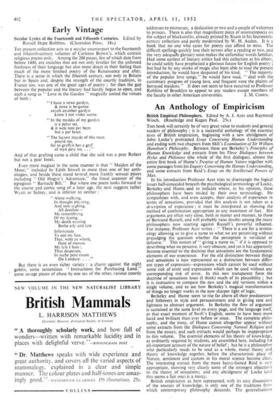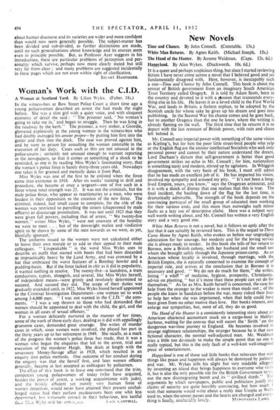An Anthology of Empiricism
Tins book will certainly be of very great value to students and general readers of philosophy : it is a successful anthology of the essential texts of British empiricism, beginning with a new abridgment of John Locke's protracted Essay Concerning Human Understanding and ending with two chapters from Mill's Examination of Sir William Hamilton's Philosophy. Between these are Berkeley's Principles of Human Knowledge and extracts from his Three Dialogues between Hylas and Philonous (the whole of the first dialogue), almost the entire first book of Hume 's Treatise of Human Nature together with some passages from his Enquiry Concerning the Human Understanding, and some extracts from Reid's Essay on the Intellectual Powers of Man.
In his introduction Professor Ayer tries to disentangle the logical issues half-concealed beneath the psychological terminology of Locke, Berkeley and Hume,-and to indicate where, in his opinion, these philosophers have been misled by their own terminology. He sympathises with, and even accepts, their analysis of experience in terms of sensations, provided that this analysis is not taken as a
description of experience ; it must be interpreted as showing the method of confirmation appropriate to any statement of fact. His
arguments are often very close, both in matter and manner, to those of Bertrand Russell, and will probably raise doubts among the many philosophers now reacting against -Russell's powerful influence.
For instance, Professor Ayer writes : " There is a use for a termin- ology allowing us to give a name to what we are perceiving without prejudging the question whether the perception is veridicial or delusive." This notion of " giving a name to," if it is opposed to describing what we perceive, is very obscure, and yet it has apparently become essential to the doctrine that sensations are the fundamental elements of our experience. For the old distinction between things and sensations is now represented as a distinction between differ- ent types of expression—expressions which cannot be used without some risk of error and expressions which can be used without any corresponding risk of error. In this new transparent form the doctrine of sensations loses (I think) much of its plausibility ; but it is instructive to compare the new and the old versions within a single volume, and to see how Berkeley's magical transformation of things no longer works in the now sharper light of logic.
Berkeley and Hume seem to rise far above all their predecessors and followers in style and persuasiveness and in giving ease and lightness to abstract argument. In Berkeley the flow of argument is sustained at the same level on every page, and the language itself, at that exact moment of Swift's English, seems to have been more
lucid and brilliant than ever before or since. The complete philo- sophy, and the irony, of Hume cannot altogether appear without some extracts from the Dialogues Concerning Natural Religion and from the essays, and such extracts would perhaps be inappropriate to this volume. The essential elements of his theory of knowledge, as ordinarily required by students, are assembled here, including his all-important account of the nature of belief ; but he is a philosopher who particularly needs to be read as a whole, moral theory and theory of knowledge together, before the characteristic place of Nature, sentiment and custom in his moral science become clear. The interesting extract from the more heavy-footed Reid is very appropriate, showing very clearly some of the strongest objections to the theory of sensations; and any abridgment of Locke (and this seems a fair one) is a mercy.
British empiricism as here represented, with its easy discussions of the sources of knowledge, is only one of the traditions from which contemporary philosophy descends. The generalisations about human discourse and its varieties are wider and more confident than would now seem generally possible. The subject-matter has been divided and sub-divided, as further distinctions are made, until no such generalisations about knowledge and its sources seem even in principle possible. But, as Professor Ayer suggests in his introduction, there are particular problems of perception and per- sonality which survive, perhaps now more clearly stated but still very far from clear ; and many problems are suggested incidentally in these pages which are not even within sight of clarification.
STUART HAMPSHIRB.



































 Previous page
Previous page